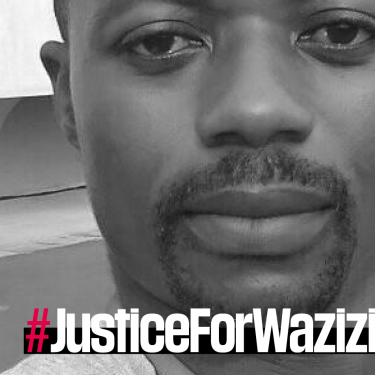Cameroonian journalist Samuel Wazizi died in detention

Reporters Without Borders (RSF) calls for a thorough and independent investigation into the circumstances leading to Cameroonian journalist Samuel Wazizi’s death while held incommunicado by the military, which was revealed this week by a national TV channel, confirmed by the journalists’ union, and confirmed directly to RSF by several military sources close to the case.
Citing “sources close to the military high command,” privately-owned Equinoxe TV reported during its 8 p.m. news programme on 2 June that Wazizi, a local TV presenter based in Buea, the capital of the English-speaking South-West Region, died during his transfer to Cameroon’s capital, Yaoundé, on an unknown date after his arrest in August 2019.
His death was confirmed by the head of the Cameroonian National Journalists’ Union (SNJC). And, when reached by RSF, a senior military officer who is very close to the case said that Wazizi had been “ill” and, without giving any further details. Another source at the Yaounde military hospital said that the journalist's body arrived at the morgue on Monday "under heavy securitu escort."
Neither communication minister and government spokesman René Emmanuel Sadi nor the head of communications at the defence ministry responded to RSF’s calls and messages.
A presenter on Buea-based Chillen Media Television (CMTV), Wazizi was held at Muea police station in Buea for the first five days after his arrest on 2 August 2019. Neither his family nor his lawyers were allowed any contact with him or were given any information about him after soldiers removed him from the police station and took him to the headquarters of the 21st Motorized Infantry Battalion in Buea on 7 August.
Wazizi was accused of speaking critically on the air about the authorities and their handling of the crisis in Cameroon’s English-speaking regions, where clashes between soldiers and separatists calling for independence or more autonomy have left more than 3,200 dead and displaced 700,000 others in the past three years.
“This TV presenter’s death while held incommunicado in a completely illegal manner by the military is the worst crime against a journalist in the past ten years in Cameroon,” said Arnaud Froger, the head of RSF’s Africa desk. “There was no justification for holding him in an army barracks and no excuse for his death. The murky circumstances surrounding this case must be clarified. Did he die as a result of beatings received while detained, as his lawyers suspect? Was he ill and denied appropriate care, as suggested by a military source contacted by RSF? We call on the Cameroonian authorities to end the intolerable silence around this case, to return the journalist’s body to his family, and to conduct a thorough, independent investigation to establish the chain of responsibility and circumstances leading to this tragedy.”
The failure to produce Wazizi at a hearing before the Fako high court in South-West Region on 28 May in response to a habeas corpus petition by his lawyers reinforced their previously expressed fears that he was probably dead. The 28 May hearing was quickly adjourned until 9 June.
The last time a journalist died in detention in Cameroon was on 22 April 2010, when Cameroun Express editor Ngota Ngota Germain, also known as Bibi Ngota, died in Yaoundé’s Kondengui prison. The authorities said his death was “the result of HIV-related opportunistic infections” but his family believed his died because he was denied appropriate care for his asthma and hypertension.
RSF has been battling for months to prevent another journalist, Amadou Vamoulké, the former head of Cameroon’s state radio and TV broadcaster CRTV, from suffering the same fate. Vamoulké is 70 and at least one coronavirus case has been detected in Kondengui prison, where he has been held provisionally for nearly four years. After asking for months for him to be medevacked, RSF has just referred his case to the UN special rapporteur on the right to health.
Cameroon is ranked 134th out of 180 countries and territories in RSF's 2020 World Press Freedom Index, three places lower than in 2019.



